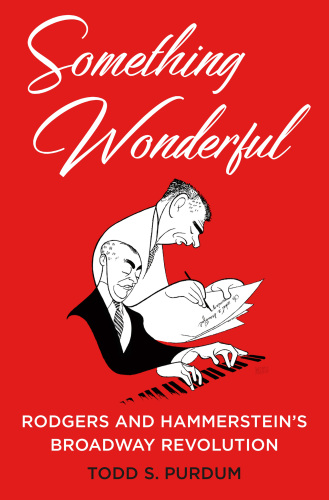
Something Wonderful
Rodgers and Hammerstein's Broadway Revolution
کتاب های مرتبط
- اطلاعات
- نقد و بررسی
- دیدگاه کاربران
نقد و بررسی

January 8, 2018
No songwriting duo is as ubiquitous in American pop culture as Richard Rodgers and Oscar Hammerstein, argues Purdum (An Idea Whose Time Has Come) in this thorough biography of the pair that largely focuses on two decades of wild success beginning with Oklahoma! and triumphantly concluding with The Sound of Music. Purdum follows Rodgers and Hammerstein separately through their formative years before their meeting in the early 1940s ushered in a sweeping revolution on Broadway. Though many pages are devoted to somewhat formulaic chronologies of the duo’s hallmark productions and also their less-successful ventures, such as Allegro, Purdum sufficiently explores their conflicting personalities, savvy business practices (they established a music publishing company and produced other plays), and sheer innovation, all of which led to the endurance of their work. Despite waning critical acclaim in the twilight years of their partnership, Rodgers and Hammerstein continued to have commercial success (largely fueled by The Sound of Music). Purdum’s anecdote-filled account is a sterling primer on the influential duo, both for newcomers to their work and to those looking to rekindle an old flame.

February 1, 2018
Veteran reporter-writer Purdum (An Idea Whose Time Has Come) shows how composer Richard Rodgers and lyricist Oscar Hammerstein were not only a great show-writing team but revolutionary for their time. Between 1943 and 1949, they expanded the boundaries of Broadway musical theater with Oklahoma!, Carousel, and South Pacific, along the way amassing huge fortunes. As a team, they won every award there was, including two Pulitzers, and in 1951, the top shows on Broadway were theirs: South Pacific and The King and I. Hammerstein's multiple drafts of his lyrics let readers see how he molded them as he wrote and rewrote. Purdum presents ample evidence of Rodger's equally meticulous attention to detail. Their essays in social conscience may sound timid today, but they stood out back then, most notably in the song "You've Got To Be Taught To Hate" from South Pacific. Purdum's comments concerning both their personal and musical failures (most notably, 1947's Allegro) are clear, fair, and to the point. VERDICT This lively book will appeal to anyone who loves theater, songwriting, or biography. [See Prepub Alert, 10/4/17.]--David Keymer, Cleveland
Copyright 2018 Library Journal, LLC Used with permission.

February 1, 2018
From an incomparable partnership, musical theater rang out with ebullience, lyricism, and soaring melodies.Composer Richard Rodgers (1902-1979) had worked with the lyricist Lorenz Hart before teaming up with Oscar Hammerstein II (1895-1960) in 1942; Hammerstein already had decades of experience in theater, beginning in 1915 when he joined a university troupe as a writer and performer. As Politico senior writer Purdum (An Idea Whose Time Has Come: Two Presidents, Two Parties, and the Battle for the Civil Rights Act of 1964, 2014) amply shows in his joyous, brisk, and gossipy dual biography, their partnership brought out the best in both men: from Hammerstein, lyrics of "shimmering loveliness." His lyrics, Julie Andrews remarked with admiration, were "rich, brilliantly constructed and so very specific to the worlds they created together," scored by Rodgers' "melodically glorious" music. They worked independently but with uncanny synergy: Hammerstein wrote the words first, sending them to Rodgers, who composed with incredible speed. Once asked how long it took him to compose the entire score of Oklahoma!, he estimated "about five hours." Purdum calls their creativity "alchemy," which aptly describes the magic that resulted in some of the most iconic Broadway shows of the mid-20th century, including Oklahoma!, Carousel, South Pacific, The King and I, and The Sound of Music. The author traces the chronology of each show--even the lesser-known productions and the flops--from lighting upon an idea through developing a storyline, writing music, finding a director, hiring a cast (many young singers rose to stardom in the duo's musicals), and assembling a team. Although they closely managed their productions, they depended on other talented participants, notably orchestrator Robert Russell Bennett; choreographers Agnes de Mille and Jerome Robbins; vocal arranger Trude Rittmann; and scenic designer Jo Mielziner. Aside from work, Rodgers and Hammerstein were not confidants, although they signed their correspondence "love." Yet they revealed depths of emotion in music, as one friend put it, that "parses the grammar of the heart."An exuberant celebration of musical genius.
COPYRIGHT(2018) Kirkus Reviews, ALL RIGHTS RESERVED.

Starred review from March 15, 2018
The songs of Richard Rodgers and Oscar Hammerstein have provided the background music to many of our lives. Here, readers will learn the stories behind the music and how this most successful of writing duos crafted some of the finest musicals to grace the American stage, including Oklahoma!, Carousel, South Pacific, and The Sound of Music. Although the biographies of Rodgers and Hammerstein are naturally threaded throughout, this is much more the story of the music rather than the men. Written chronologically, the book details the evolution of the Broadway musical, from lighter-than-air plots and songs that could be plugged in at will, to more cohesive and deeper offerings like Show Boat and Pal Joey, and, finally, to Rodgers and Hammerstein, who were determined, as Purdum puts it, to broaden and deepen their art. This meant intertwining plot, music, and dance to tell their stories, but also taking on social issues?for instance, racial prejudice in South Pacific and cross-cultural conflict in The King and I. Ironically, Purdum also shows how some of these musicals fall short to contemporary ears in just those areas, the treatment of spousal abuse in Carousel being a prime example. The often-distant relationship between Rodgers and Hammerstein means that they don't quite come alive for readers, but the music and the stories of how it came to be certainly does. Something wonderful, indeed.(Reprinted with permission of Booklist, copyright 2018, American Library Association.)

























دیدگاه کاربران